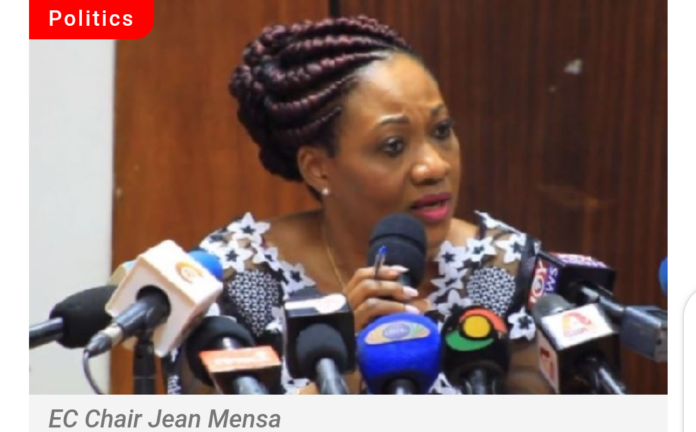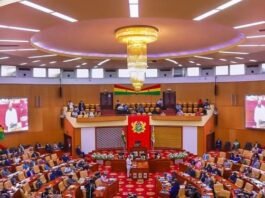Mr Takyi-Banson is praying the court to grant an order directing that C.I.126 violates the provisions of article 42 and 45 of the 1992 Constitution to the extent that it excludes Birth Certificates issued to Ghanaians as a mode of identification and establishing qualification to be registered in the register of voters.
The plaintiff is also seeking similar relief for the voter ID card as well as a declaration that the Electoral Commission’s decision to compile a new register of voters is “inconsistent with and a violation of article 45(a) of the 1992 constitution of the Republic of Ghana.”
Already, the biggest opposition party, the National Democratic Congress (NDC), is challenging the EC’s exclusion of the voter card from the registration process.
On Thursday, 12 June 2020, the Director of Legal Affairs of the party, Mr Abraham Amaliba, said the NDC was compelled by the Supreme Court to let go its first relief in its two-pronged suit against the EC.
“If your correspondent was in court, he would have told you that the NDC did not voluntarily abandon the first relief”, Mr Amaliba told Class91.3FM’s Blessed Sogah on the 505 news programme, adding: “Indeed, we argued that it was possible for the Supreme Court to deal with both reliefs because one bordered on the Constitution, the other was on the CI that would allow the EC to use passports and NIA cards. So, we were of the view that it was possible for the Supreme Court to deal with the two issues.
“However, they declined and asked us to elect which of them we wanted to pursue and, so, in our wisdom, we decided for the second relief, which relief had some element of dealing with the register in such a way to have the same effect as if the register has not been compiled. And, so, if you look at the wisdom in our selection, it will tell you that if we got the second relief granted by the Supreme Court, then it will eventually mean that the register has not been compiled anew, and, so that’s what happened but it’s not as if we went to court voluntarily to have our first relief struck out”, Mr Amaliba explained.
The NDC, with regard to the first relief, sought to stop the EC from conduction a registration exercise for a new voter roll ahead of the 2020 polls in addition to its attempt to compel the election management body to use the old voter ID card for compiling a new register of voters.
At the Supreme Court hearing on Thursday, the lawyer for the NDC, Mr Godwin Edudzi Tameklo, abandoned the first relief after the panel asked him to choose one of the two.
Meanwhile, the Supreme Court has set 23 June 2020 as the date to deliver judgement on the NDC v. EC case currently before it concerning whether or not the election management body can exclude the old voter ID card from its forthcoming registration exercise.
The seven-member panel chaired by Chief Justice Anin Yeboah, gave the date after the lawyers of the National Democratic Congress and the Electoral Commission, respectively, gave their arguments to support their stance.
There was heavy security presence at the Supreme Court before Thursday’s hearing of the contentious case between the two bodies.
Scores of armed security personnel from the Formed Police Unit of the Ghana Police Service besieged the court to provide security for today’s hearing.
Per C.I.126 recently passed by Parliament, the Ghana card and passport are the only documents that eligible voters can use as proof of citizenship, to get registered for the new voter card ahead of the 2020 polls.
In the absence of either of the documents, a registrant would need two already-registered Ghanaians to vouch for him/her as a Ghanaian before that person is registered.
The National Democratic Congress (NDC) – which has dragged the EC to the Supreme Court for interpretation of the laws of Ghana relative to that contention – as well as some civil society organisations, have raised qualms with the exclusion of the current voter ID from the registration process.
Last week, the EC, in a 31-page document, wrote to the Supreme Court explaining why it excluded the current voter ID card from the exercise.
In its writ, the NDC argued that “the 2nd Defendant (EC) has no legal basis to exclude the use of existing voter ID cards for the purposes of registration and that should this Court allow the 2nd Defendant to deny Ghanaian citizens the use of their existing voter ID cards for registration, it would impair the right of citizens to register and vote. That would be a dent on the gains made by this Court in giving life and meaning to Article 42 of the Constitution”.
The party’s lawyers said: “We end by relying on the poignant statement by Kpegah JSC in Apaloo versus Electoral Commission supra at page 410 where His Lordship stated: “Thus, consistent with our belief in and adherence to the principle of universal adult suffrage, the right to register and vote is guaranteed every citizen of Ghana who is eighteen years or above and not of unsound mind. In the case of Tehn-Addy v Electoral Commissioner [1996-97] SCGLR 589, the plaintiff was denied the chance to register as a voter, and he brought an action claiming that the Electoral Commission had violated the Constitution, 1992. This court unanimously held that every sane Ghanaian citizen of eighteen years and above had the right under article 42 of the Constitution, 1992 to be registered as a voter. And that the constitutional right of voting was indispensable in the enhancement of the democratic process and it could not be denied in the absence of a constitutional provision to that effect”. “The function of the 2nd Defendant under article 45(e) is to undertake programmes for the expansion of the registration of voters and not to undermine or place unnecessary impediments on registration. The 2 Defendant’s constitutional function includes making it easier to register to vote and not to place impediments on the enjoyment of that fundamental right to be registered and o vote”.
“In the circumstances, we invite this Honourable Court not to be frightened by the spectre of ghosts, minors and foreigners on the register. For ghosts may be able to receive salaries when on the payroll but cannot appear to vote when on the voter roll and foreigners and minors can be removed from the roll of voters if the 2nd Defendant is diligent and does its work well”, the NDC’s argument said.
In the EC’s counter-arguments, the election management body provided to the apex court the following legal reasons why it is not allowing the existing voter identification card to be used in the upcoming voter registration exercise.
EC’s reasons The existing voter register which was compiled in 2012 pursuant to CI 72 and revised since by limited registration exercises has been held by this Honourable Court as not being reasonably credible. By implication, the cards issued pursuant to it are also not reasonably credible.
In respect of the cards issued pursuant to ci 12, the 2nd Defendant (EC) has found that those voter identification cards were issued without any form of identification at all and its ineligibilities, breaches and excesses were imported into the 2012 register pursuant to CI 72 in breach of Article 42 and displacing the credibility of the CI 12 cards.
The 2nd Defendant found a fundamental omission in its training manual and the manner in which the voter registration exercise was carried out in 2012 partly in breach of its own binding CI 72 and also in breach of Article 42 of the Constitution.
The 2nd Defendant wants a break from the past to remedy all the carried-on ineligibilities, excesses and breaches of Article 42 as the existing cards have become fruits of a “poisoned tree”. It will be in continuous breach of article 42 of the constitution, to totally disregard this Honourable court’s own judgment to continue using the existing cards and It is in contravention of Section 8(1) of Act 750 (as amended) for the 2nd Defendant to accept the existing voter identification cards as a means of proving citizenship for the compilation of the new register.
Your Lordships, we (EC) submit that what Section 8(1) of Act 750 (as amended) has done is to effectively exclude the existing voter identification card as a form of identification for the purposes of proving citizenship which is the first and foremost qualification required of an individual applying to be registered as a voter. It is the considered opinion of the 2nd defendant (EC) that to accept any form of identification, including the existing voter identification cards, which is not provided for under Section 8(1) Act 750 (as amended) as a means of proving identification for the compilation of the new register will be in contravention of statute.
The case is being adjudicated by a seven-member panel of justices presided over by the Chief Justice, Justice Anin Yeboah.
Source: Classsfmonline.com












